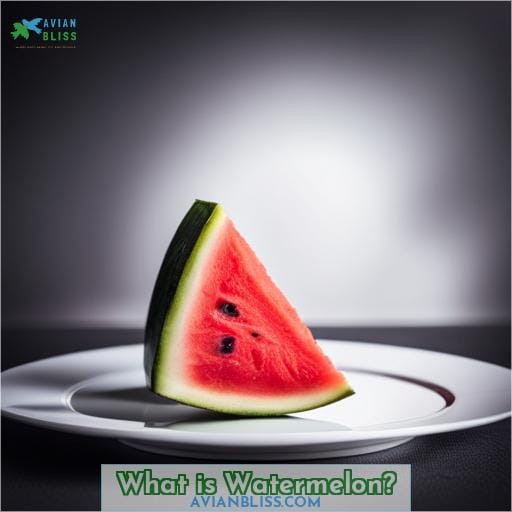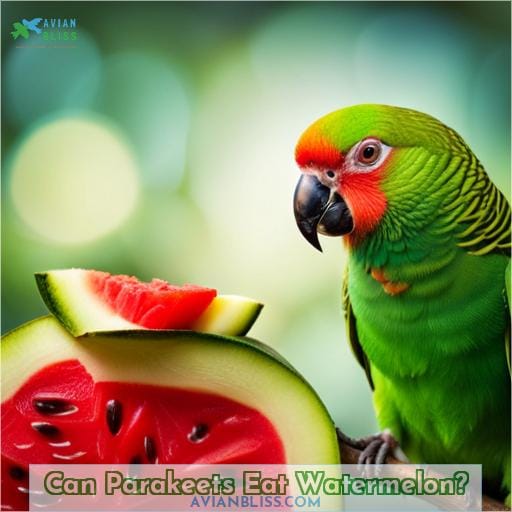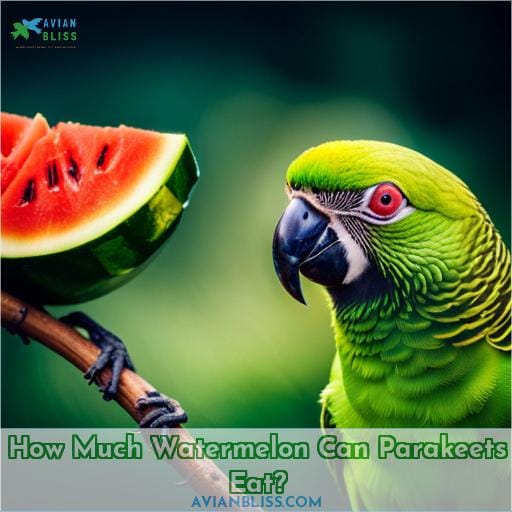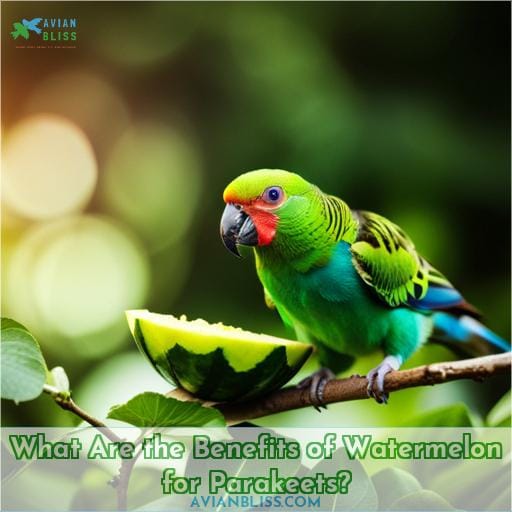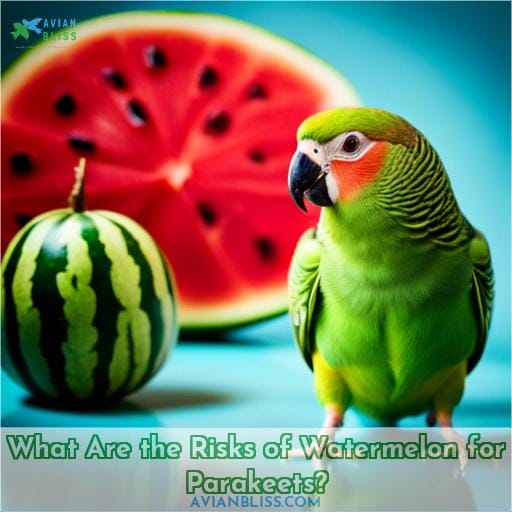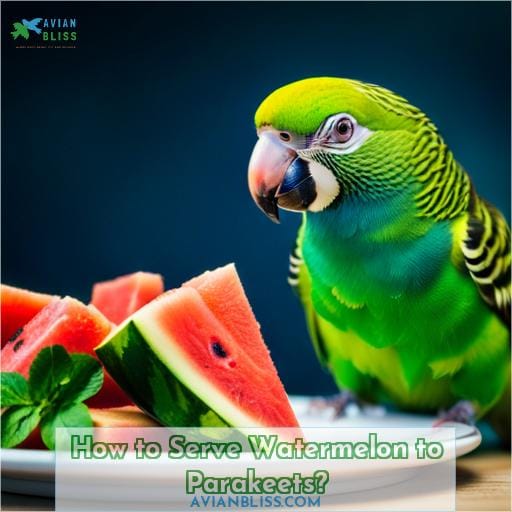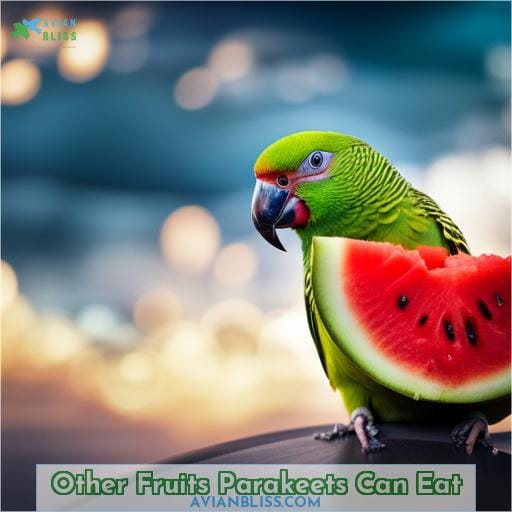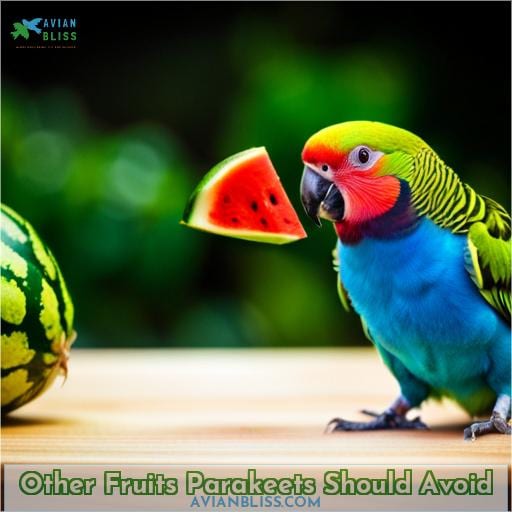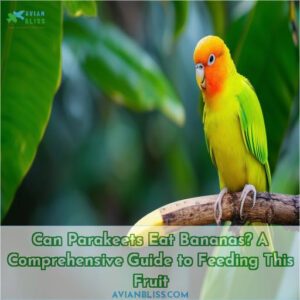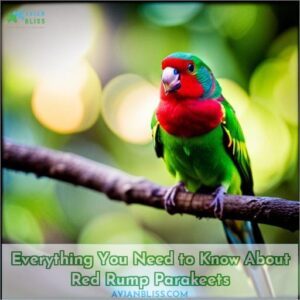This site is supported by our readers. We may earn a commission, at no cost to you, if you purchase through links.
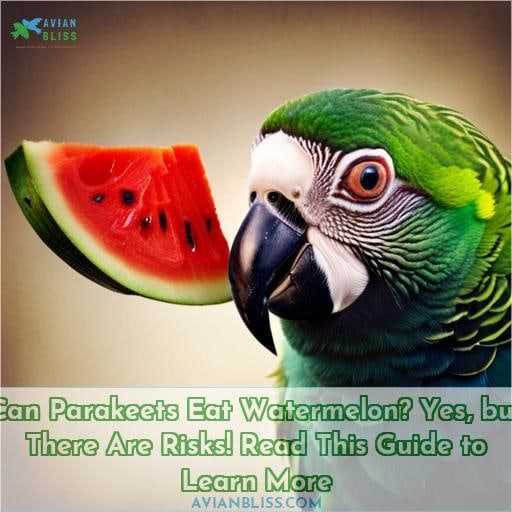 Watermelon is a healthy and refreshing treat for parakeets, but there are some risks associated with feeding it to them.
Watermelon is a healthy and refreshing treat for parakeets, but there are some risks associated with feeding it to them.
Watermelon is a good source of:
- Vitamin A
- Vitamin C
- Potassium
- Fiber
- Lycopene
These nutrients are all important for parakeets’ health. However, watermelon also contains a lot of sugar, which can be harmful to parakeets if they eat too much of it.
To avoid this, only give your parakeet a small piece of watermelon at a time. You can also remove the seeds and rind before feeding it to your parakeet, as these parts contain the most concentrated amount of sugar.
It is also important to make sure that the watermelon you are feeding your parakeet is fresh and ripe. Expired or rotten watermelon can contain harmful bacteria that can make your parakeet sick.
If you are unsure whether or not a watermelon is safe to feed your parakeet, it is best to err on the side of caution and throw it away.
By following these tips, you can safely feed watermelon to your parakeet and give them a healthy and delicious treat.
Table Of Contents
- Key Takeaways
- What is Watermelon?
- Can Parakeets Eat Watermelon?
- How Much Watermelon Can Parakeets Eat?
- What Are the Benefits of Watermelon for Parakeets?
- What Are the Risks of Watermelon for Parakeets?
- How to Serve Watermelon to Parakeets?
- Other Fruits Parakeets Can Eat
- Other Fruits Parakeets Should Avoid
- Frequently Asked Questions (FAQs)
- Conclusion
Key Takeaways
- Watermelon is a healthy and nutritious fruit for parakeets.
- Watermelon rind and seeds are not safe for parakeets to consume.
- A good serving size for a parakeet is about 1/4 cup of watermelon per day.
- Be sure to store watermelon in a cool, dry place.
What is Watermelon?
Watermelon is a juicy, refreshing fruit that’s a popular summer treat.
It’s a type of melon that’s high in water content and has a sweet, juicy flavor.
Watermelon is also a good source of vitamins A, C, and K, as well as potassium and magnesium.
The red flesh of watermelon is the most nutritious part of the fruit, while the green rind is less nutritious.
The seeds of watermelon are also edible, but they aren’t as nutritious as the flesh.
Watermelon is a healthy and delicious fruit that’s a great way to stay hydrated during the summer months.
Can Parakeets Eat Watermelon?
Watermelon is a healthy and nutritious fruit that’s a great source of vitamins, minerals, and antioxidants.
However, watermelon rind and seeds aren’t safe for parakeets to eat. The rind is a choking hazard, and the seeds contain a toxin that can be harmful to parakeets.
Therefore, it’s important to only feed your parakeet the flesh of the watermelon.
How Much Watermelon Can Parakeets Eat?
Eating watermelon is a healthy way to add hydration and nutrients to your parakeet’s diet.
- Watermelon is a good source of water, vitamins A, C, and K, as well as protein and potassium.
- Watermelon seeds are toxic to parakeets, so be sure to remove them before feeding your parakeet watermelon.
- Watermelon rind is also not safe for parakeets to eat, as it can be a choking hazard.
- A good serving size for a parakeet is about 1/4 cup of watermelon per day.
- Be sure to store watermelon in a cool, dry place. Watermelon that isn’t properly stored can spoil quickly and can make your parakeet sick.
What Are the Benefits of Watermelon for Parakeets?
Watermelon is a healthy fruit for parakeets. It’s a good source of water, vitamins A, C, and K, as well as protein and potassium.
Watermelon rind isn’t safe for parakeets, as it can be a choking hazard and contains harmful pesticides.
Watermelon seeds are also not safe for parakeets, as they can be a choking hazard and contain harmful toxins.
Watermelon is a healthy fruit for parakeets.
You can feed your parakeet up to 10% of their daily diet in watermelon.
Watermelon is a sweet, juicy, and refreshing fruit that’s also nutritious. It’s a good source of water, vitamins A, C, and K, as well as potassium.
– Watermelon rind is not safe for parakeets.
To ensure the safety of your parakeet, it’s important to note that the rind of watermelon shouldn’t be given to them.
Watermelon rind is a choking hazard and can cause harm due to harmful pesticides present on its surface.
Feeding your parakeet watermelon rind can lead to digestive issues such as diarrhea and vomiting.
Additionally, ingesting the rind can also result in dehydration for your feathered friend.
It’s best to remove the rind before offering watermelon as a treat for your parakeet’s well-being.
– Watermelon seeds are not safe for parakeets
Parakeets shouldn’t eat watermelon seeds as they can be harmful to their health. Here are some reasons why watermelon seeds aren’t safe for parakeets:
- Watermelon seeds are a choking hazard.
- Watermelon seeds contain harmful toxins.
- Parakeets may have difficulty digesting the hard outer shell of the seed.
- Ingesting large quantities of watermelon seeds can cause gastrointestinal blockages.
It is important to remove all the seeds before feeding watermelon to your parakeet to ensure its safety and well-being.
What Are the Risks of Watermelon for Parakeets?
While watermelon is a healthy fruit for parakeets, there are some risks associated with feeding it to them.
- Watermelon rind is a choking hazard for parakeets.
- Watermelon seeds can also be a choking hazard.
- Watermelon can also cause diarrhea and dehydration in parakeets.
- Finally, watermelon can cause weight gain in parakeets, which can lead to obesity and other health problems.
As such, it’s important to feed watermelon to your parakeet in moderation and to avoid feeding them the rind or seeds.
How to Serve Watermelon to Parakeets?
Serve watermelon to your parakeets in small, rindless pieces.
Here are 3 tips for serving watermelon to your parakeets:
- Cut the watermelon into small pieces that are easy for your parakeet to eat.
- Remove the rind and seeds from the watermelon before serving it to your parakeet.
- Serve the watermelon at room temperature.
Watermelon is a healthy and nutritious fruit that can be enjoyed by parakeets. It’s a good source of water, vitamins, and minerals. However, it’s important to serve watermelon to your parakeets in moderation, as it’s high in sugar.
Other Fruits Parakeets Can Eat
You can offer a variety of fruits to your parakeet as part of their balanced diet.
- Apples
- Pears
- Grapes
- Berries
- Bananas
- Mango
- Melons
- Oranges
- Peaches
- Nectarines
- Dates
- Kiwi
- Papaya
- Pineapple
When feeding your parakeet fruit, be sure to remove the seeds and pits first. You should also wash the fruit thoroughly to remove any pesticides or other harmful chemicals.
Fruit should only be offered to your parakeet as an occasional treat. It shouldn’t make up more than 10% of their daily diet.
Fruit is a healthy and nutritious addition to your parakeet’s diet. It provides them with essential vitamins, minerals, and antioxidants. Offering your parakeet a variety of fruits will help them stay healthy and happy.
Other Fruits Parakeets Should Avoid
Parakeets should generally avoid fruits that are high in acidity, such as lemon and lime.
Other fruits that parakeets should avoid include:
- Pomelo
- Grapefruit
- Kumquat
- Avocado
- Passion fruit
- Fig
- Guava
- Nectarine
- Pomegranate
- Peach
These fruits can cause digestive problems for parakeets, such as diarrhea and vomiting.
If you’re unsure whether a fruit is safe for your parakeet to eat, it’s best to err on the side of caution and avoid it.
Frequently Asked Questions (FAQs)
What are the signs of a parakeet that has eaten too much watermelon?
If your parakeet has eaten too much watermelon, you may notice that it’s:
- Acting lethargic
- Has diarrhea
- Is vomiting
You should contact your veterinarian immediately if you’re concerned that your parakeet has eaten too much watermelon.
Can parakeets eat watermelon rind?
Yes, parakeets shouldn’t eat watermelon rind.
It’s a choking hazard and can contain harmful pesticides.
Remove the rind before serving watermelon to your parakeet to ensure their safety and well-being.
Can parakeets eat watermelon seeds?
No, parakeets can’t eat watermelon seeds.
They’re a choking hazard and can also contain harmful toxins.
Can parakeets eat watermelon that has been frozen or refrigerated?
You may offer your parakeet watermelon that has been frozen or refrigerated, but it’s best to serve it at room temperature.
Just be sure to remove the rind and seeds before serving.
Can parakeets eat watermelon that has been cooked or processed?
No, it isn’t safe for parakeets to eat watermelon that has been cooked or processed.
The cooking process can destroy the nutrients in the watermelon, and the processing can add harmful chemicals to the watermelon.
Conclusion
Watermelon is a delicious and nutritious treat for parakeets, but it’s important to feed it to them in moderation. Too much watermelon can cause health problems for your parakeet, so be sure to follow the tips in this guide to keep your feathered friend healthy and happy.
[Keypoints]Tips for feeding watermelon to parakeets:
- Only give your parakeet a small piece of watermelon at a time.
- Make sure the watermelon is fresh and ripe.
- Remove the seeds and rind from the watermelon before giving it to your parakeet.
- Wash the watermelon thoroughly before giving it to your parakeet.
- Store the watermelon in a cool, dry place.
- Do not give your parakeet watermelon that has been cut or opened for more than a few hours.

